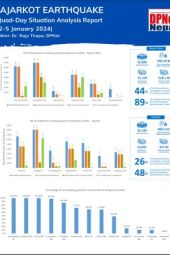Jajarkot Earthquake : Quad-Day Situation Report (2-5 Jan 2024)
Summary
This report emphasizes the challenges facing earthquake-affected populations in earthquake affected districts Jajarkot and Rukum West. A key issue is the discrepancy in shelter fund disbursement, where beneficiaries struggled to withdraw government-allocated funds for temporary shelters. This was primarily due to some banks' refusal to use existing social security accounts for these transactions, forcing many to open new accounts and causing delays in grant distribution. Although Nepal Bank Limited has begun depositing funds into existing social security accounts, other banks have not followed suit, leading to confusion and frustration among the beneficiaries.
In addition to financial challenges, the report addresses the disruption of education caused by the earthquake. Many school buildings were damaged, necessitating the establishment of temporary learning centers (TLCs). While significant progress has been made in constructing these TLCs, there are still challenges in completing them, impacting the resumption of regular schooling. The psychological impact on students is also notable, with many exhibiting signs of trauma and disinterest in attending classes, necessitating the intervention of psychosocial counselors.
Government efforts in reconstruction have also been a focus, with discussions on enhancing the capabilities of the NDRRMA through legislative amendments. The aim is to streamline processes and expedite relief and reconstruction efforts. However, bureaucratic delays and insufficient fund allocation have hindered these efforts.
The report further highlights the health concerns arising from the cold weather, with an increase in cold-related illnesses like pneumonia, diarrhea, and asthma among the earthquake survivors, who are largely residing in inadequate makeshift shelters. Lastly, the report shares a personal story of a widow struggling to cope with the loss of her husband and son in the earthquake. Despite the trauma and challenges, she remains determined to rebuild her life and provide for her daughter, highlighting the resilience and ongoing struggles of the earthquake victims.
Categories:
DPNet Publication
Sub-Categories:
Situation Analysis Report
Published Year:
2024
